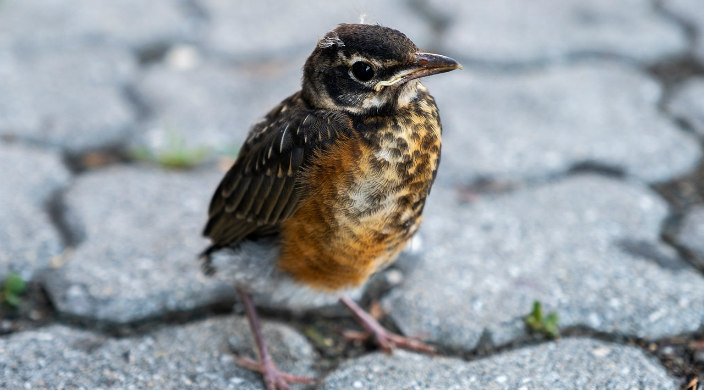
I have a story to tell you. It’s about a tiny bird. But I’ll come back to that.
Tishah B’Av has been set aside as a day for the Jewish community to remember the destruction of the Jerusalem Temple two thousand years ago. Traditionally, this day is observed with fasting, prayers of lament and rituals of mourning. Two thousands years is a very long time, however, and grief abates.
So if Tishah B’Av no longer compels, what’s to be done with it?
Earlier this week, while I was trying to figure this out, I took my dog for a walk. Not 10 feet outside the front door, we encountered a baby bird on the ground. It was alive, but I couldn’t tell by how much. I could only imagine it had fallen from its nest perhaps 50 feet above and that couldn’t have been good.
Charlie sniffed but respectfully backed away. My wife Ellen came out and very gently carried the bird to the bottom of the tree from which it had fallen. It was out of direct sunlight and the possibility of getting stepped on. It laid its head on its wing to rest. Not 30 minutes later, we checked on it, and it had died.
For a good while after, our home was subdued. Even Charlie seemed quiet. It was only a baby bird, but in the few minutes that it had entered our lives, it had evoked our sympathy and stolen our hearts. We grieved.
I wondered: Is this what we need in order to feel the pain of loss? If we are to act on human suffering, must we experience that suffering firsthand?
I have a handmade tallit (prayer shawl) that I purchased in Israel. Before completing the order, I was asked, “What text would you like embroidered on the atarah [crown]?” Well, that was going to take some thought and I returned home to America without completing the order. What text would I want to see every time I place that garment across my shoulders? Three weeks later, I sent them my response. It came from the Book of Job (38:35):

For me, this text, God’s response to Job’s asking what we all want to know, “Why?” Why has my health failed? What has my loved one died? Why is my marriage over? Why did that earthquake have to cause so much destruction? How can that leader condone so much suffering?
God’s response to Job was that there is so much we can’t control. And there are questions for which we will never have answers.
We may not like that response, but it seems pretty accurate to me.
There is a passage, however, from Noah benShea’s Jacob the Baker that helps me live with this unsettling reality:
Watching a flotilla of small sticks and leaves dropped into a river race and tumble around one bend only to be caught in another, someone said, “Clearly we are not in control of where our lives are going.” But another responded, “We are nevertheless responsible for how we conduct ourselves as we are carried on.”
This is how I’ve tried to approach my life, which has been a pretty easy one compared to so many others, but I’ve had my share of sorrows. I don’t hide my grief, but I try not to be crushed by it either.
Here’s what I’ve been thinking about Tishah B’Av: Each of us quite likely has horrible moments that are ours. Not all are the result of evil people, but they are painful memories no less. Loved ones die. Natural disasters claim the lives of hundreds. Political disasters (like tearing immigrant children away from their parents) exact a different but no less painful price.
Tishah B’Av comes along. We allow our pain to reemerge, even after 2,000 years. Or we just remember — we don’t own, or we don’t directly feel, that pain. The message in both cases, I believe, is that these memories and their concomitant feelings are valid but, if possible, they ought not end there. Painful memory can and should be used for good purpose.
Perhaps by limiting this communal grief to a single day, Jewish tradition is trying to say, “It doesn’t have to ever go away. But like that flotilla of small sticks and leaves, we need to choose how to live in its aftermath. Always always, choose life.”
We needn’t relinquish our sadnesses forever. The hurt might never fully go away. But if in addition to missing what has been lost, we can turn that grief (and our hearts) toward making the world a bit more hospitable for someone else, then our pain and the grief that comes from someone’s life having ended far too soon (or whatever it is that lingers on), perhaps we can turn it toward something of deepening value and even personal redemption.
That little bird haunts me. I think I’ll be carrying the image of its dying for a while yet. I don’t think I’m going to become a bird doctor, but my sadness did prompt me to write this — and perhaps, as Tishah B’Av approaches, that’s of some worth and a fine way to channel this loss.
For me, that seems like a good lesson learned.
Related Posts

Harnessing the Power of our Mothers Around the Seder Table

Melding Tradition and Innovation: Our Interfaith Toddler Naming Ceremony


